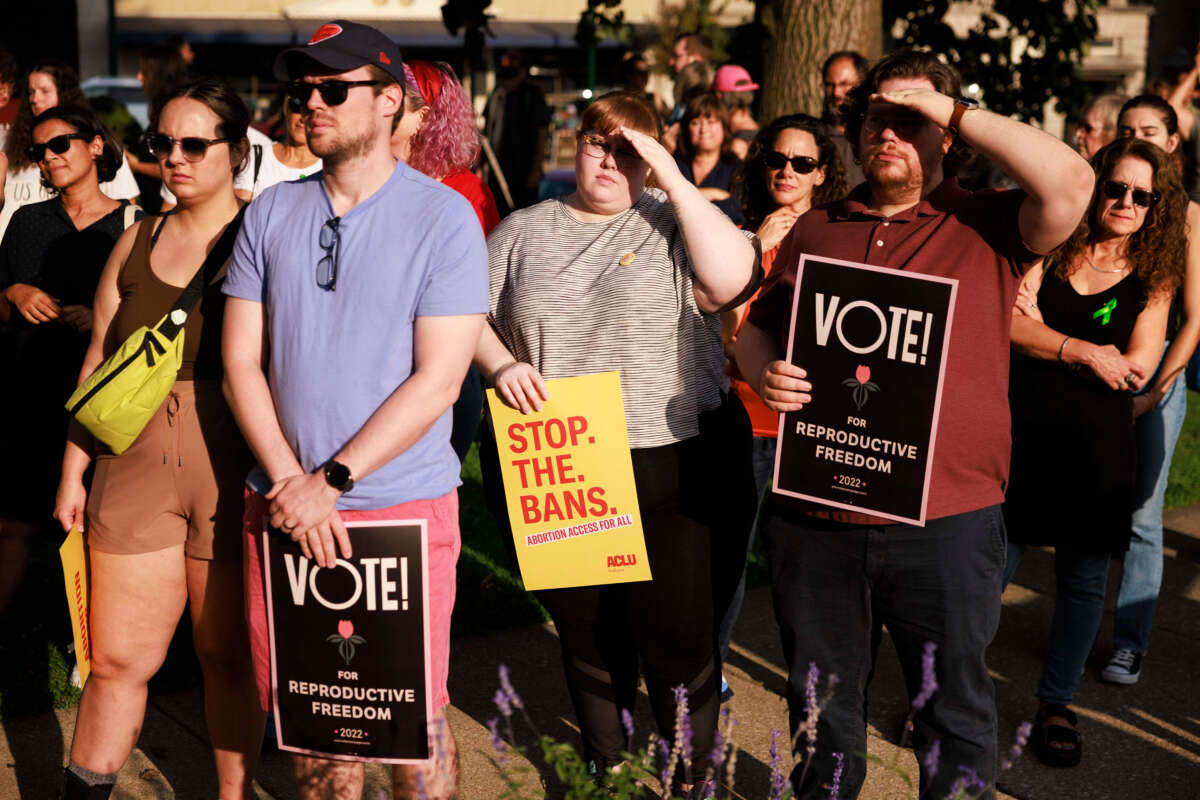Honest, paywall-free news is rare. Please support our boldly independent journalism with a donation of any size.
On Thursday, the Indiana Court of Appeals upheld a lower court preliminary injunction, affirming that individuals who have religious objections to the state’s abortion ban should be exempt from it.
“For many Hoosiers, the ability to obtain an abortion is necessary based on a sincerely held religious belief,” Ken Falk, American Civil Liberties Union (ACLU) of Indiana Legal Director, said in a statement. “The burden placed on these individuals by Indiana’s abortion ban is absolute and life-altering. The Religious Freedom Restoration Act is clear that it protects religious freedom for all Hoosiers, and the Court of Appeals’ decision today reflects that clear directive.”
Indiana was one of the first states in the country to ban abortion after the U.S. Supreme Court overturned the constitutional right to the procedure in 2022. While the state was at first enjoined from implementing the law, the ban went into effect on August 30, 2023.
In 2022, the ACLU of Indiana filed a lawsuit challenging the abortion ban on behalf of five state residents and the group Hoosier Jews for Choice. The legal challenge argued that the abortion ban violated the state’s Religious Freedom Restoration Act, which was signed into law by conservative lawmakers in 2015. The state’s religious freedom law applies to anyone whose religious beliefs are burdened or “likely to be substantially burdened” by a law.
“The ban on abortion will substantially burden the exercise of religion by many Hoosiers who, under the new law, would be prevented from obtaining abortions, in conflict with their sincere religious beliefs,” Falk said in 2022.
The ACLU’s lawsuit argues that the state’s abortion ban violated Jewish beliefs that “a fetus attains the status of a living person only at birth” and that “Jewish law stresses the necessity of protecting the life and physical and mental health of the mother prior to birth as the fetus is not yet deemed to be a person.”
In December 2022, a state trial court ruled in favor of the plaintiffs. The state appealed the decision to the Indiana Court of Appeals, which also sided with the plaintiffs in the unanimous holding. In the majority opinion, Indiana Court of Appeals Judge Leanna Weissmann wrote that, “The religious exemption that [the women] seek, based on their sincere religious beliefs, merely expands the circumstances in which the pregnant woman’s health dictates an abortion.”
Similarly, Judge Mark Bailey wrote in a concurring opinion that:
Legislators, an overwhelming majority of whom have not experienced childbirth, nevertheless dictate that virtually all pregnancies in this state must proceed to birth notwithstanding the onerous burden upon women and girls. They have done so not based upon science or viability but upon a blanket assertion that they are the protectors of ‘life’ from the moment of conception. In my view, this is an adoption of a religious viewpoint held by some, but certainly not all, Hoosiers.
The Indiana Court of Appeals not only upheld a preliminary injunction against the state’s abortion ban for plaintiffs with sincerely held religious beliefs guiding them to terminate pregnancies, but also upheld the lower court’s decision to proceed with the lawsuit as a class action. This ruling extends the lawsuit’s coverage to all individuals whose religious convictions align with obtaining an abortion currently prohibited by state law.
“If there are women who have these religious beliefs and who need an abortion because of them, I would suggest they contact us,” Falk said. “They are members of the class that we represent, all these persons now, and they should contact us and we can determine what steps to take.”
While reproductive rights advocates celebrated the three-judge panel’s ruling, the holding does not have an immediate effect and will likely be appealed to the state Supreme Court within the next 45 days.
Media that fights fascism
Truthout is funded almost entirely by readers — that’s why we can speak truth to power and cut against the mainstream narrative. But independent journalists at Truthout face mounting political repression under Trump.
We rely on your support to survive McCarthyist censorship. Please make a tax-deductible one-time or monthly donation.
